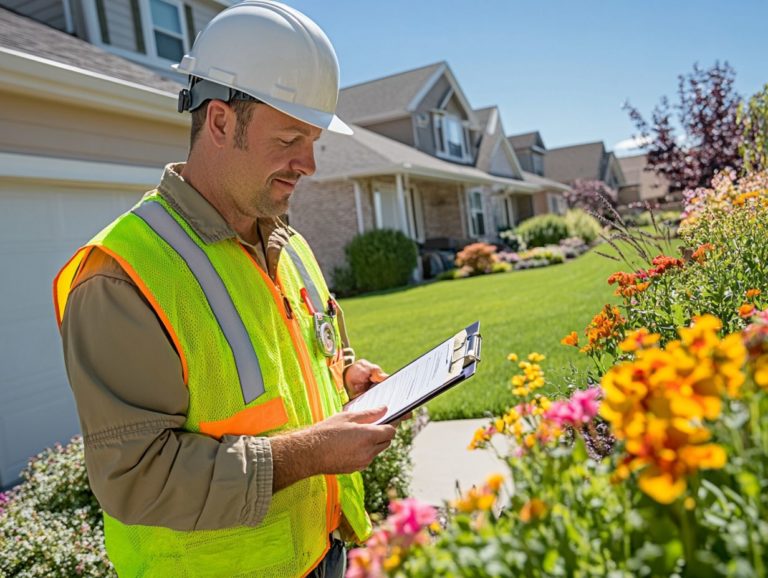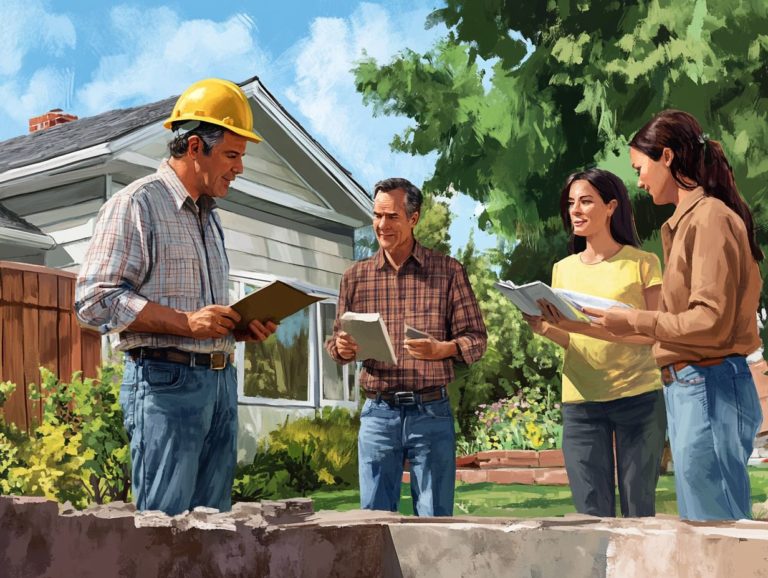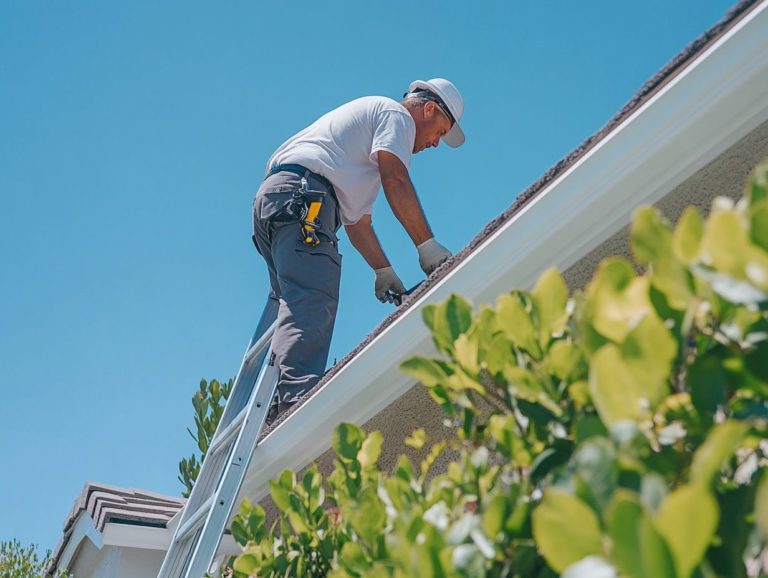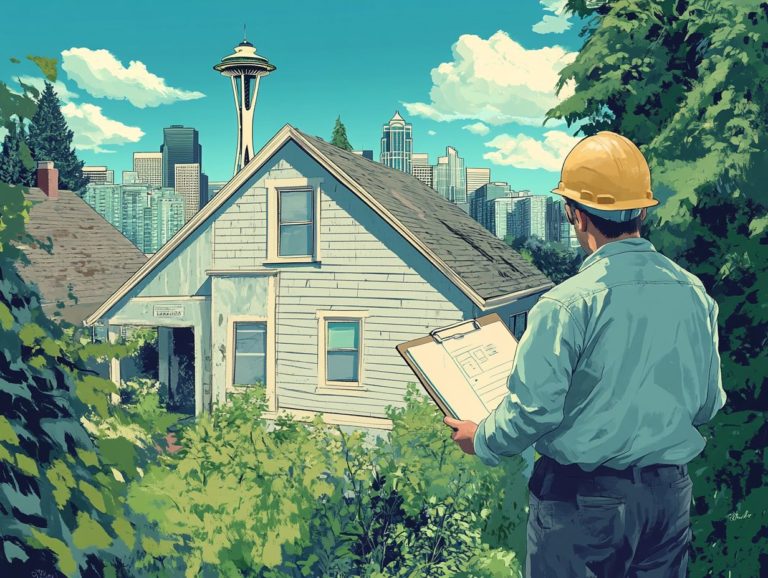Understanding Home Inspection Protocols
Purchasing a home stands as one of life’s most significant investments. Don t leave your future to chance! Understanding the home inspection process is crucial, as it can shield you from costly surprises in the future.
This article provides a detailed exploration of everything you should know about home inspections from what they are and their purpose to when they become essential.
You ll be guided through the inspection process, with insights on what to look for in a report and valuable tips on selecting the right inspector. Arm yourself with the knowledge that will pave the way for a successful home buying experience!
Contents
- Key Takeaways:
- What is a Home Inspection?
- When is a Home Inspection Necessary?
- The Home Inspection Process
- What to Look for in a Home Inspection Report
- Choosing a Home Inspector
- Preparing for a Home Inspection
- Frequently Asked Questions
- What are home inspection protocols?
- Why is understanding home inspection protocols important?
- What areas of the home are typically included in a home inspection?
- How long does a home inspection take?
- Do I need to be present during the home inspection?
- What happens if issues are found during the home inspection?
Key Takeaways:

Home inspections are thorough evaluations of a property’s condition, typically conducted before a purchase or sale. They can identify potential issues and help both buyers and sellers make informed decisions.
Home inspections are necessary in various situations, such as when buying or selling a home, before major renovations, or as part of regular maintenance. They provide peace of mind and prevent unexpected expenses.
The home inspection process involves a comprehensive examination of the property, including its structure, systems, and components. A detailed report will be provided, highlighting any major concerns or red flags that should be addressed, so it’s crucial to understand the home inspection process thoroughly.
What is a Home Inspection?
A home inspection is an essential step you should undertake as a homebuyer. It evaluates the physical structure and condition of a property before sealing the deal.
This meticulous assessment is designed to uncover any potential issues, empowering you to make an informed decision regarding the structural health and overall integrity of the home. The findings from this inspection can significantly influence negotiations and impact the appraisal value of your future investment.
When is a Home Inspection Necessary?
Home inspections are essential in various scenarios, especially when you re considering a significant investment and aiming to secure a mortgage.
Lenders typically mandate a comprehensive inspection as part of the home appraisal process. This protects their investment and ensures that the property adheres to specific standards.
Taking this step can provide you with peace of mind as you navigate the complexities of purchasing a home.
The Home Inspection Process
The home inspection process is a meticulous evaluation performed by qualified professionals, aimed at delivering a thorough assessment of a property’s condition, including understanding home inspection standards and practices.
You can expect a detailed examination of key structural components, such as the roof, foundation, plumbing, electrical systems, and HVAC. This process is guided by a comprehensive inspection checklist, ensuring that no detail is overlooked and that you receive an in-depth understanding of the home inspector’s role and the property’s status.
What to Look for in a Home Inspection Report
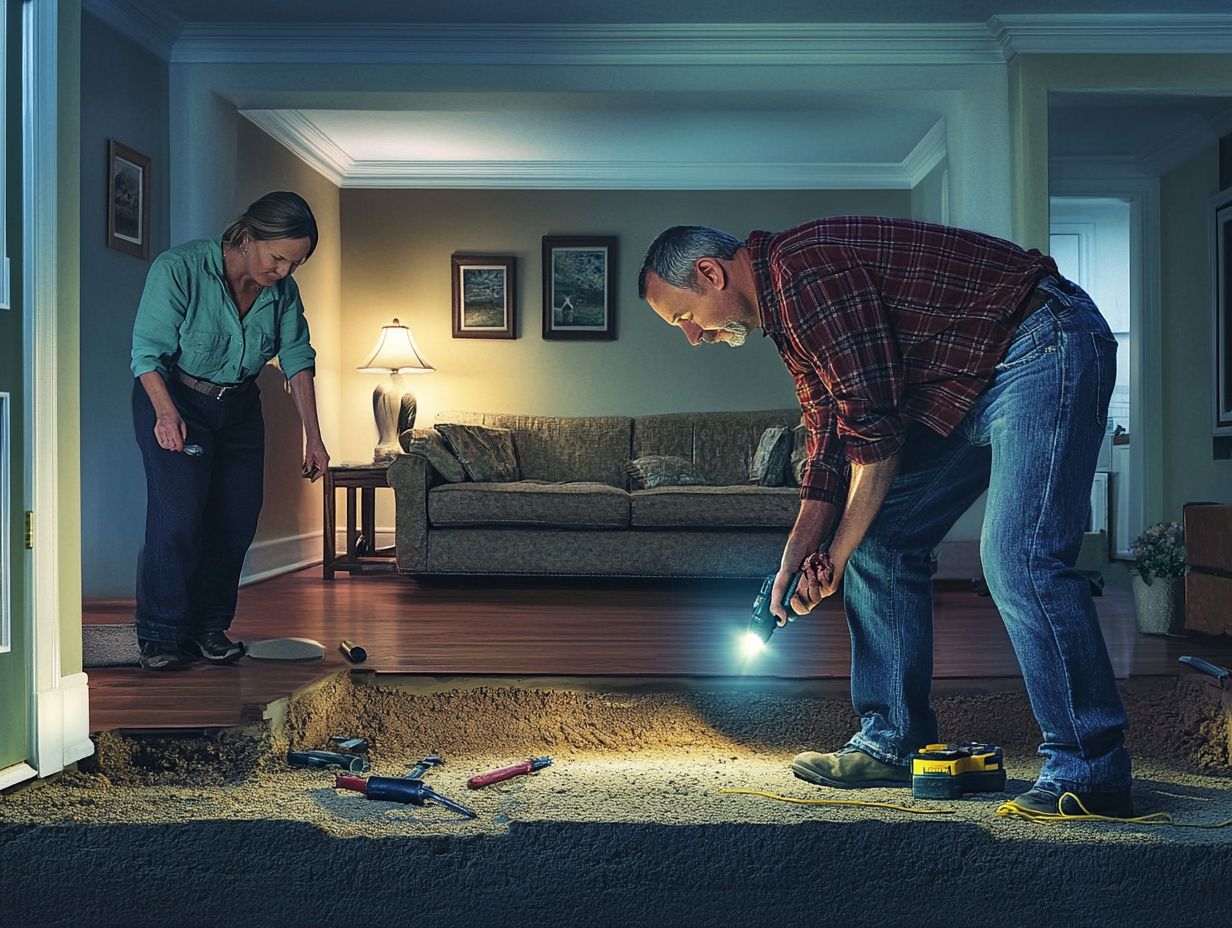
A home inspection report is an essential document that captures the findings of the inspection, highlighting key elements and potential defects within the property that may need urgent attention. For more insights, check out understanding the basics of home inspections.
This report acts as a valuable guide for you as a homebuyer, profoundly impacting your negotiations with sellers concerning repairs or home warranties.
Choosing a Home Inspector
Selecting the right home inspector is crucial for obtaining a thorough and precise evaluation of the property you re considering. Their expertise significantly influences the quality of your inspection report.
When making this important choice, it s essential to weigh factors such as:
- Credentials
- Experience
- Adherence to ASHI standards or InterNACHI guidelines (which are organizations providing standards for home inspectors)
- Customer reviews
These elements will help ensure you receive a comprehensive assessment that protects your investment. Start your search today for the perfect inspector who can give you peace of mind.
Preparing for a Home Inspection
Preparing for a home inspection can truly elevate the experience, ensuring a successful evaluation that benefits both homebuyers and sellers. Understanding the home inspection reports can further enhance this process.
By taking proactive measures like addressing minor repairs and providing easy access to all areas of the property you can pave the way for a smoother inspection process and sidestep any unexpected delays.
This thoughtful preparation not only demonstrates care for the property but also sets the stage for a more favorable outcome.
1. Understanding the Importance of a Home Inspection
A home inspection is crucial for homebuyers. It safeguards against potential issues with the property’s structure.
An appealing fa ade can be captivating. However, hidden problems may be lurking beneath.
A professional inspection examines essential components like the roof, plumbing, and electrical systems, uncovering concerns such as outdated wiring or concealed leaks that could snowball into expensive repairs if ignored.
Take, for instance, a seemingly minor roof leak. If unchecked, it could result in significant water damage and mold growth, costing you thousands in repairs. Skipping this critical step could lead to unexpected financial headaches in the future.
Don’t overlook a thorough inspection! It’s your best defense against future headaches.
2. Common Myths About Home Inspections
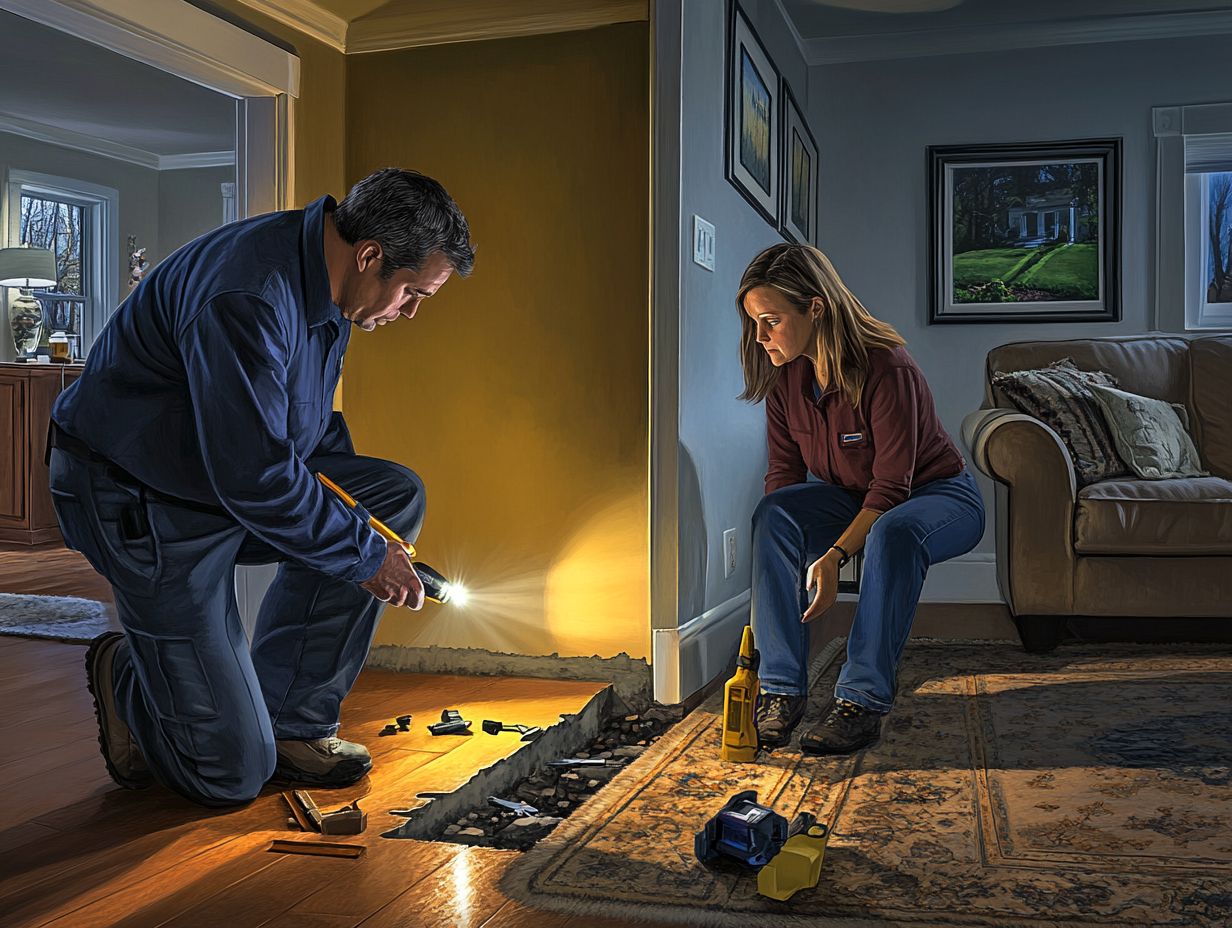
There are several prevalent myths about home inspections that can easily misguide you as a home buyer. One common misconception is that all inspections are created equal or that they can uncover every single defect in a home.
You might assume that every inspector operates from a standardized checklist, but it’s crucial to remember that understanding the home inspection process can vary widely among professionals due to their experience and expertise.
While a home inspection is indeed a vital step in your buying journey, it shouldn’t be viewed as a warranty against future problems. A qualified inspector can offer a comprehensive assessment of visible and accessible components, but their insights are limited to what they can observe without invasive techniques.
By grasping these limitations, you can set more realistic expectations and truly appreciate the value of a thorough evaluation conducted by skilled professionals.
3. The Cost of a Home Inspection
The cost of a home inspection is a crucial consideration for you as a home buyer. It can fluctuate based on the size, age, and location of the property, but generally speaking, it s a modest investment for the peace of mind and potential savings it offers.
Typically, you can expect to spend between $300 and $700 for a comprehensive inspection. Factors like regional demand and the complexity of the property will significantly influence the final price.
While this upfront cost might appear hefty, the long-term value of the inspection is truly irrefutable. By uncovering potential issues before you seal the deal, you can steer clear of unexpectedly high repair bills later on, ultimately protecting your investment and ensuring that your new home is a wise financial choice.
4. The Role of Home Warranties in Home Inspections
Home warranties can significantly enhance your home inspection experience, providing coverage for defects that may surface during the inspection and offering you an extra layer of protection as a home buyer.
This added security eases worries about costly repairs that could hit you right after you buy! For example, if the inspection uncovers an aging heating, ventilation, and air conditioning (HVAC) system, a warranty can cover repairs or replacements, ensuring you re not caught off guard by unexpected expenses.
A warranty can also serve as a powerful negotiating tool, enhancing the appeal of a home by reducing perceived risks for potential buyers. In this way, your investment in a warranty can facilitate smoother transactions and bring greater peace of mind for everyone involved.
5. How to Use the Inspection Report to Negotiate Repairs
Using the inspection report effectively gives you the power to negotiate necessary repairs with the seller. This ensures that critical issues are addressed before you finalize the purchase.
This report serves as a valuable tool, highlighting common areas of concern, such as plumbing, roofing, and electrical issues that many buyers often overlook during their initial walkthrough.
When you share these findings with the seller, you not only showcase your knowledge but also help you get a better deal. Clear communication is key. A friendly approach can help both you and the seller agree on repairs.
By understanding each other s priorities and addressing concerns through structured dialogue, you significantly enhance your chances of achieving a satisfactory resolution.
Frequently Asked Questions
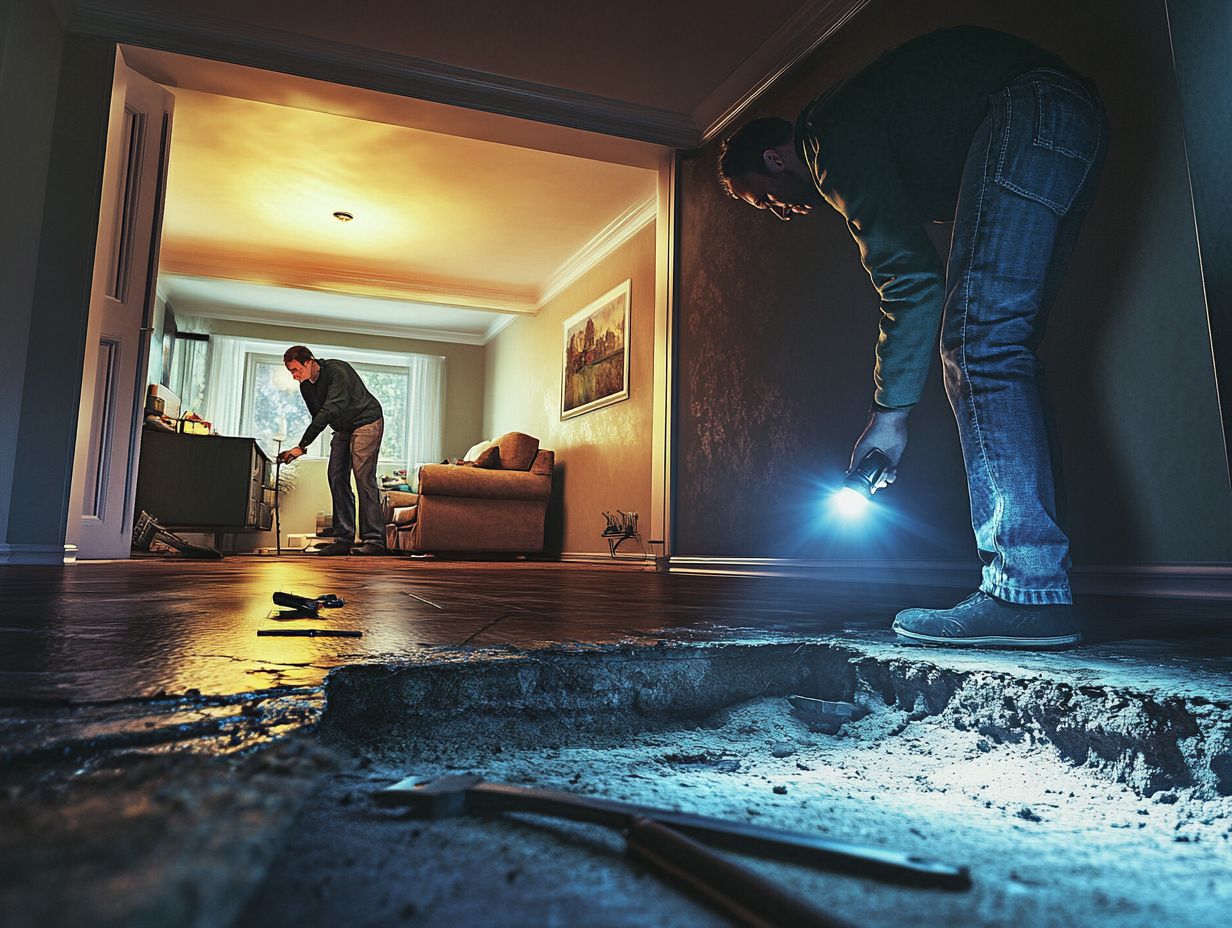
What are home inspection protocols?
Home inspection protocols are the rules that inspectors follow to check a house. Understanding these home inspection protocols ensures that all essential areas of the home are thoroughly inspected and reported on accurately.
Why is understanding home inspection protocols important?
Understanding home inspection protocols is important because it helps you know what to expect during a home inspection. This knowledge also aids in understanding home inspection standards and what potential issues may be uncovered.
What areas of the home are typically included in a home inspection?
A standard home inspection typically includes the exterior and interior of the home, covering the roof, foundation, plumbing, electrical systems, heating and cooling systems, and major appliances. For a deeper insight, refer to understanding the process of home inspections. Some inspectors may offer additional services for an extra fee, such as inspecting the pool or septic system.
How long does a home inspection take?
The length of a home inspection can vary depending on the size and condition of the home. On average, an inspection can take anywhere from 2 to 4 hours. However, larger or more complex homes may require more time.
Do I need to be present during the home inspection?
While it is not required, it is highly recommended that you attend the home inspection. This gives you the opportunity to ask questions and gain a better understanding of the inspection findings. It also allows you to see any potential issues firsthand.
What happens if issues are found during the home inspection?
If issues are found during the home inspection, the inspector will provide you with a detailed report outlining their findings. It is then up to you to discuss any repairs or negotiations with the seller. You may also choose to walk away from the purchase if the issues are too significant.


